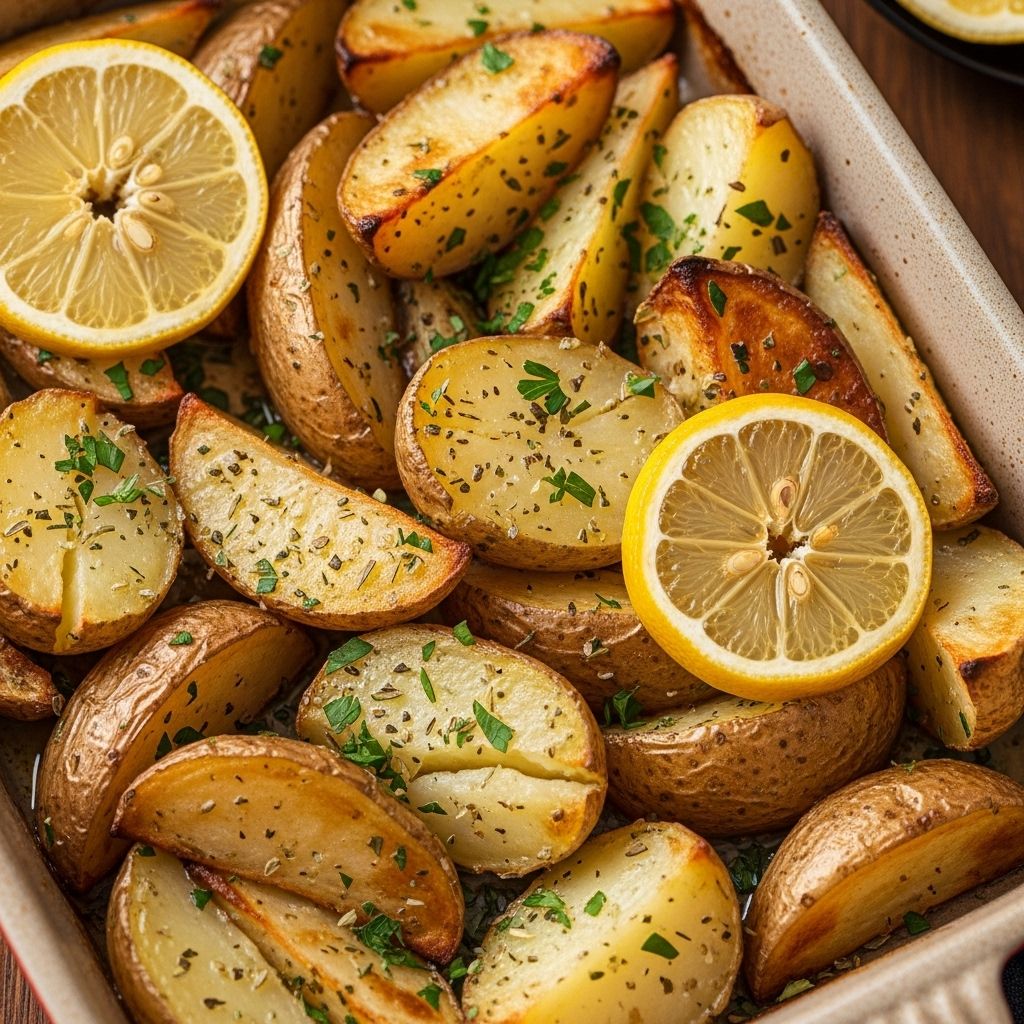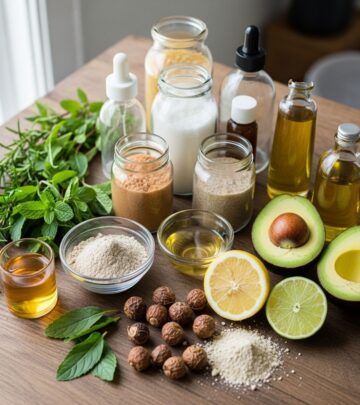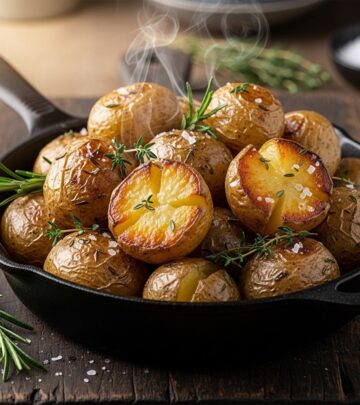Best Greek Lemon Potatoes Recipe – Mediterranean Perfection
Lemon juice, herbs, and olive oil turn Yukon Golds into a bright and aromatic side dish.

Greek lemon potatoes, known as Patates Lemonates in Greece, represent one of the most beloved and iconic side dishes in Mediterranean cuisine. This recipe transforms simple Yukon Gold potatoes into a golden, tender masterpiece that perfectly balances tangy lemon brightness with aromatic herbs and rich olive oil. Unlike ordinary roasted potatoes, these Greek-style spuds are braised in a flavorful mixture that infuses every bite with Mediterranean sunshine.
The beauty of this dish lies in its simplicity and the way it allows each ingredient to shine. Fresh lemon juice provides the signature brightness, while chicken broth creates a savory base that keeps the potatoes moist and tender. Olive oil ensures beautiful browning and adds that essential Mediterranean richness, while fresh oregano brings the unmistakable flavor of Greek cuisine to your table.
Why This Greek Lemon Potatoes Recipe Works
This particular approach to Greek lemon potatoes delivers consistent, restaurant-quality results every time. The technique combines roasting and braising methods, starting with a flavorful liquid mixture that the potatoes absorb as they cook. As the liquid reduces, the potatoes begin to caramelize and develop a beautiful golden exterior while maintaining their creamy, tender interior.
The key difference between this recipe and standard roasted potatoes is the addition of chicken broth and lemon juice, which creates steam during the initial cooking phase. This steam helps cook the potatoes evenly while infusing them with flavor. As the liquid evaporates in the second half of cooking, the potatoes develop that coveted crispy exterior that makes Greek lemon potatoes so irresistible.
Essential Ingredients for Authentic Greek Lemon Potatoes
Fresh Lemon Juice
Fresh lemon juice serves as the cornerstone of this recipe, providing the bright, tangy flavor that gives these potatoes their name. Using fresh-squeezed lemon juice rather than bottled makes a significant difference in both flavor and authenticity. You’ll need about two large lemons to yield the required 1/3 cup of fresh juice. The natural acidity helps tenderize the potatoes while adding that unmistakable Mediterranean brightness.
Low-Sodium Chicken Broth
Chicken broth forms the savory foundation of the braising liquid, working alongside the lemon juice to create a flavorful cooking medium. The broth helps keep the potatoes moist during roasting while adding depth and richness. For vegetarian versions, vegetable broth makes an excellent substitute without compromising the dish’s authentic flavor profile.
Extra Virgin Olive Oil
High-quality olive oil is non-negotiable in Greek cooking, and this recipe is no exception. The olive oil serves multiple purposes: it helps the potatoes achieve beautiful browning, adds rich Mediterranean flavor, and creates the perfect texture contrast between the crispy exterior and creamy interior. Use the best olive oil you can find, as its flavor will be prominent in the finished dish.
Fresh Oregano
Fresh oregano brings the authentic taste of Greek cuisine to these potatoes. Unlike dried oregano, fresh leaves provide bright, aromatic flavor that pairs perfectly with lemon and garlic. The recipe calls for roughly chopped oregano leaves, with most added to the initial mixture and the remainder reserved for finishing the dish.
Yukon Gold Potatoes
Yukon Gold potatoes are the ideal choice for this recipe due to their thin skins that become beautifully crispy and their creamy, buttery flesh that absorbs the lemony braising liquid perfectly. These potatoes hold their shape well during roasting without becoming mushy, making them superior to russets for this particular preparation.
Step-by-Step Preparation Method
Preparing Your Oven and Equipment
Begin by positioning a rack in the lower third of your oven and preheating to 425°F. The lower rack position ensures even browning while preventing the tops from burning before the potatoes are fully cooked. Use a heavy-duty rimmed baking sheet for best results, as it will conduct heat evenly and prevent warping at high temperatures.
Creating the Flavor Base
In a liquid measuring cup, whisk together the fresh lemon juice, chicken broth, olive oil, kosher salt, garlic powder, freshly ground black pepper, and two-thirds of the chopped fresh oregano. This mixture serves as both marinade and braising liquid, so thorough whisking ensures even distribution of all flavors.
The garlic powder in this recipe is specifically chosen over fresh garlic because it won’t burn during the high-temperature roasting process. Fresh garlic can become bitter when exposed to prolonged high heat, while garlic powder maintains its mellow, sweet flavor throughout cooking.
Preparing and Seasoning the Potatoes
Cut the Yukon Gold potatoes into 1-inch wedges, ensuring uniform size for even cooking. Consistency in sizing is crucial for ensuring all pieces finish cooking at the same time. Spread the potato wedges on your prepared baking sheet, then pour the prepared lemon mixture over them. Toss thoroughly to ensure every piece is well-coated with the flavorful liquid.
The Two-Stage Roasting Process
Initial Braising Phase
Roast the potatoes on the lower oven rack for 30 minutes. During this initial phase, the potatoes will absorb much of the liquid while becoming almost tender. The pan juices will bubble actively, and you’ll notice the liquid reducing significantly. This braising effect is what gives Greek lemon potatoes their characteristic tender interior.
Crisping and Finishing
After the initial 30 minutes, toss the potatoes carefully to ensure even browning, then continue roasting for an additional 10 to 15 minutes. During this final phase, the remaining juices will reduce to a beautiful glaze, and the potatoes will develop their signature golden color and slightly crispy exterior. The exact timing may vary depending on your oven and the size of your potato wedges.
Expert Tips for Perfect Results
Don’t overcrowd the pan: Ensure potatoes are in a single layer with minimal overlap. Overcrowding will cause steaming rather than roasting, preventing the desired crispy exterior from developing.
Use kosher salt correctly: The recipe specifies kosher salt, which has larger crystals than table salt. If substituting table salt, reduce the amount by about 25% to avoid over-salting.
Monitor the final stages carefully: The transition from braised to crispy happens quickly in the final 10-15 minutes. Check frequently to prevent burning while ensuring the potatoes achieve proper golden color.
Fresh herb finishing: Reserve some oregano for the final sprinkle. This adds a burst of fresh flavor and appealing visual contrast to the finished dish.
Common Questions and Troubleshooting
Should You Peel the Potatoes?
Peeling is entirely a matter of personal preference. The thin skins of Yukon Gold potatoes become tender and slightly crispy during roasting, adding textural interest and nutritional value. However, if you prefer your potatoes without skins, feel free to peel them before cutting into wedges.
Parboiling: Necessary or Not?
Unlike some potato recipes, these Greek lemon potatoes don’t require parboiling. The braising liquid provides sufficient moisture and steam to cook the potatoes evenly while developing the desired texture contrast. The two-stage roasting process eliminates the need for this additional step.
Herb Substitutions
While fresh oregano is traditional, you can experiment with other Mediterranean herbs. Fresh rosemary or thyme work beautifully with the lemon flavors. For finishing touches, consider fresh parsley or a sprinkle of chopped dill for color and additional flavor complexity.
Serving Suggestions and Pairings
Greek lemon potatoes make an excellent side dish for a wide variety of main courses. They pair particularly well with grilled or roasted meats, especially lamb, chicken, and pork. The bright lemon flavor also complements fish dishes beautifully, making these potatoes versatile enough for both casual family dinners and special occasions.
For a complete Greek-inspired meal, serve these potatoes alongside grilled chicken with tzatziki, Greek village salad, or moussaka. The potatoes also work wonderfully as part of a Mediterranean mezze spread, complementing olives, feta cheese, and fresh vegetables.
Storage and Reheating
Greek lemon potatoes are best served immediately while they’re hot and the exterior is at its crispiest. However, leftovers can be stored in the refrigerator for up to three days. To reheat, spread the potatoes on a baking sheet and warm in a 375°F oven for 10-12 minutes, which will help restore some of the original texture.
Avoid microwaving leftover Greek lemon potatoes, as this will make them soggy and eliminate the appealing textural contrast that makes this dish special.
Frequently Asked Questions
Q: Can I make Greek lemon potatoes ahead of time?
A: While best served fresh, you can prepare the lemon mixture and cut potatoes up to 4 hours ahead. Combine and roast just before serving for optimal texture and flavor.
Q: What if my potatoes aren’t browning properly?
A: Increase oven temperature to 450°F for the final 5-10 minutes, and ensure your baking sheet isn’t overcrowded. Proper browning requires adequate space and heat.
Q: Can I use different potato varieties?
A: Yukon Golds are preferred for their creamy texture and thin skins, but red potatoes can work as a substitute. Avoid russets as they may become too mealy.
Q: How do I know when the potatoes are perfectly done?
A: Look for golden-brown edges, easily pierced centers with a fork, and mostly evaporated pan juices that have reduced to a light glaze.
Q: Can I double this recipe for a crowd?
A: Yes, but use two separate baking sheets to avoid overcrowding. Overcrowded potatoes will steam instead of roast, preventing proper browning and crisping.
This authentic Greek lemon potatoes recipe brings the sunny flavors of the Mediterranean to your dinner table with minimal effort and maximum impact. The combination of bright lemon, aromatic herbs, and perfectly roasted potatoes creates a side dish that’s both comforting and sophisticated, suitable for everyday meals and special occasions alike.
References
- https://www.wholesomeyum.com/greek-lemon-potatoes/
- https://www.thepioneerwoman.com/food-cooking/recipes/a39357030/greek-lemon-potatoes-recipe/
- https://ufso1.com/opa-get-your-best-summer-side-dish-from-the-pioneer-woman-ree-drummond-greek-lemon-potatoes/
- https://www.thepioneerwoman.com/food-cooking/recipes/a90261/exploring-greek-flavors-and-greek-roasted-potatoes/
- https://www.thepioneerwoman.com/potatoes/
Read full bio of medha deb












